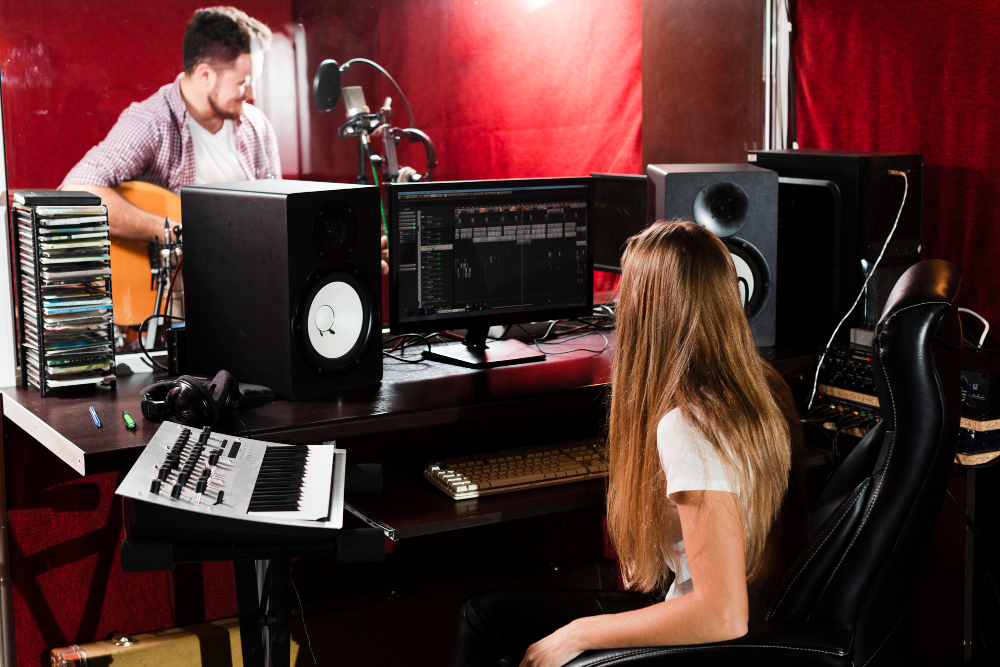How to Become a Music Composer: Skills, Education, and Tips for Success
Every soundtrack, song, and background score evokes some emotion. Music composers craft authentic music for films, TV shows, games, and advertising. They combine different elements – melodies, rhythm, and harmonies – and experiment with the pitch and texture to deliver the perfect track.
Composers create music that complements the visuals of a game or a movie and captures the mood it’s portraying. They adjust the various components so the sound enhances the plot and makes the viewers feel connected to what they are watching.
Read on to learn more about the field and get tips on how to become a music composer.
What Are The Skills Needed to Become a Music Composer?
Music connects people to their thoughts and feelings and helps them bond with others who share their tastes.
So, what does it take to become a music composer who delivers tracks people resonate with?
Read Also: 7 Key Benefits of Pursuing a Music Production Course
If you are new to music composition, focus on mastering the technical skills and learn relevant digital tools & software to get ahead of the curve –
- Train your ears – Aural skills are important for translating individual elements of music into a cohesive track. It is a fundamental skill a composer needs to begin their music career. Develop a strong base in identifying and transcribing sounds and don’t forget regular practice.
- Knowledge of Music Theory – Understanding how to read music sheets and interpreting & analyzing music is crucial for deepening your knowledge & appreciating the art form. Knowing music theory and training your ears go hand in hand. It will let you explore the elements of music and learn the basic rules you need to follow as a musician.
- Learn About the Elements of Music Composition – A soundtrack combines different elements of music – melodies, rhythm, pitch, harmony, and texture. Knowledge of each of these helps the composer make informed choices and produce music that synchronizes with visual mediums.
- Composition Techniques – Composing music, soundtrack, and background score techniques vary depending on the genre, theme, and mood. A holistic understanding of these techniques and knowledge of Western and Indian music enriches the track and showcases the artist’s expertise in their craft.
- Instrumentation & Orchestration Skills – As a music composer you must know how different instruments can enhance different tracks and can be used together for a seamless composition. You can use different instruments for different segments of a song and create a rich tune. Make sure the orchestration sounds effortless and cohesive.
- Creativity – You must fuel your creative drive to become a successful music composer. Listen to different kinds of music, experiment with genres, and explore new technologies to compose novel tracks.
- Software Skills – The music industry is gradually becoming digitally driven. Stay updated on the latest innovations. Get acquainted with DAWs, audio editing, and mixing & mastering software. These digital tools allow you to experiment more freely, fuse tracks, and make the process of composing more efficient & productive.
Training & Education Required to Master Music Composition
Professional training in universities and conservatories allows people to master fundamental skills and makes the transition to the professional sphere smooth.
- Think About Formal Education – If you are thinking about a degree in music composition, you can pursue undergraduate and postgraduate courses in music and related fields.
The bachelor’s degrees typically span 3-4 years and focus on the basics of music composition & production and help you be proficient in technical skills. The master’s-level courses span 2 years and provide advanced training in music composition and production.
Here are some popular courses that you can check out –
- B.A. in Music Composition
- Bachelor of Music (BMus)
- B.A. in Instrumental Music
- B.F.A in Music
- Bachelor of Performing Arts (BPA) in Music Composition
- M.A. in Music Composition
- M.F.A in Music
- Use Online Resources – If you want to specialize in a particular genre of music, or refine skills you already have, online tutorials and certification programs are great options. You can find both paid & unpaid courses spanning 4 weeks to 12 months. The best part about using online resources is that you can do it from anywhere, even alongside your job.
- Practice More – With regular practice comes familiarity with the craft & confidence. It will improve your listening skills, help develop a better understanding of music theory, and make you an expert in using digital tools.
Read Also: Which Music Lessons Are Best for You: Piano or Guitar Classes?

How to Build a Career as a Music Composer?
Now that you know what skills and qualifications you need, let’s explore how you can become a music composer with a perfect route map to approach the industry.
- Build professional connections – You can attend events, and local shows, and optimize social media to connect with musicians, fellow composers, and music producers. Networking is a great way to enhance your visibility, find new opportunities, and collaborate on interesting projects. It will deepen your understanding of the industry & help you keep up with the trends.
- Understand and adapt to the latest trends in the music industry – Keep up with what’s new and get acquainted with the advanced tools. Learn to work with DAW, Audio editing tools & other mixing software that are popular among professionals.
Read Also: How to Start a Career in Music Production? A Step-by-Step Guide
- Understand copyrighting and licensing – It will allow you to protect your music from unauthorized uses, reinforce the originality of your work, and increase your credibility in the industry.
- Create a unique portfolio – Include a variety of techniques & genres you’ve worked with. Add music sheets you have created, demo tracks, showreels, audio files of original compositions, and behind-the-scene studio shots and clips. Arrange the tracks and sheets in a way that engages the viewers.
- Create a Personal Brand – Leverage social media to create a personal brand. Interact with followers and potential clients and publish relevant work that showcases a unique style. Be consistent with what you do and mix different formats – audio, video, notations – to add originality. You can also create a website for yourself so clients and recruiters can easily find you online.
- Connect with clients/recruiters – Use social media platforms & leverage your industry connections. Focus on a client-centric approach while interacting. Write cover letters when connecting with recruiters. Update your portfolio to emphasize genres and styles that would resonate with the clients/recruiters.
- Develop business skills – Financial planning, developing marketing & promotional ideas, and negotiating with clients are essential if you want to become a music composer. These skills will help increase your visibility, boost your income, and get better work opportunities.
Tips for Becoming a Successful Music Composer
Here are some tips that you can use to succeed in your music composition career –
- Find inspiration in unique things around you & record unconventional tracks. Experiment with instrumentation and try out different styles to stay motivated.
- Upskill regularly. Learning new skills will open up many doors and lead you to fun-filled and high-paid work opportunities.
- Collaborate with other artists. Create new music together & experiment with different styles. This will help you with networking and learning more about the industry.
Read Also: Top Trends in Music Education for 2024: What’s New and Exciting?
Conclusion
Make the most of music composition by learning to adapt to the latest trends, getting familiar with digital tools, and experimenting with your craft. Build a brand for yourself. Leverage social media, and make connections in the industry. This would enhance your visibility, get you better opportunities, and help you understand the business of music.
As a musician, you can never practice enough. The more you practice, the better you will be at composing. Keep learning new skills so you can give your hundred percent in every project.
Still wondering how to become a music composer and enter the professional world?
Consider formal training to master the essential skills and access industry-standard tools & resources. With hands-on training and adequate industry exposure, you can kickstart your career right after the degree. AAFT School of Music offers a range of courses in related fields that would provide you with all the things you need to become a professional musician.











